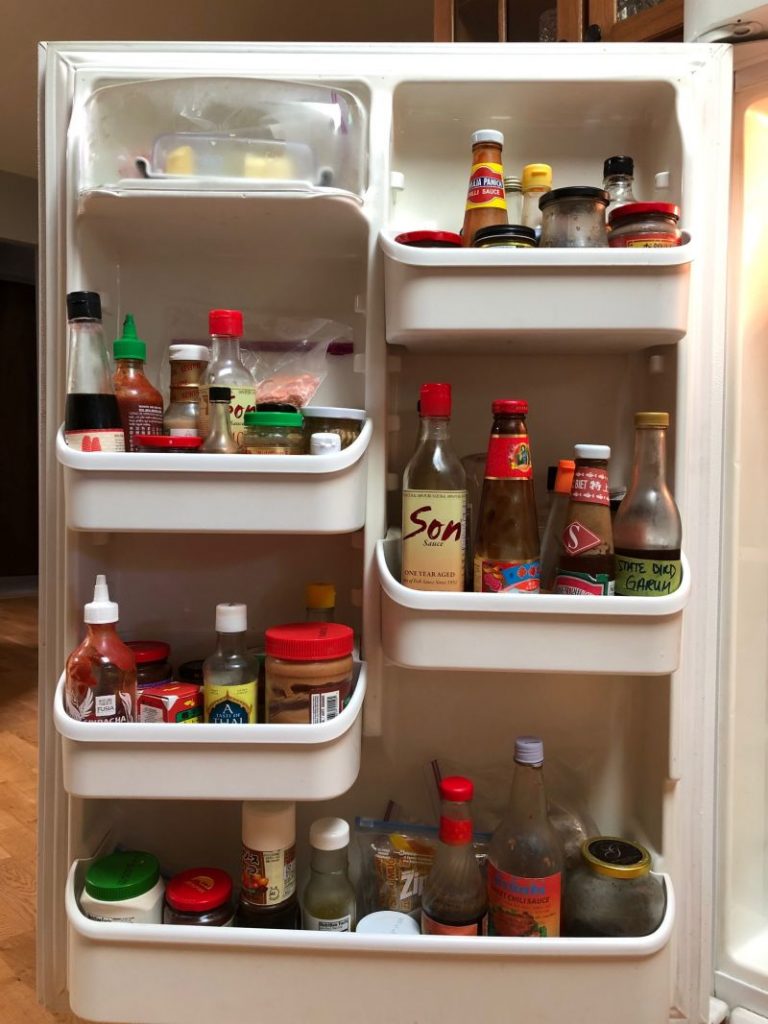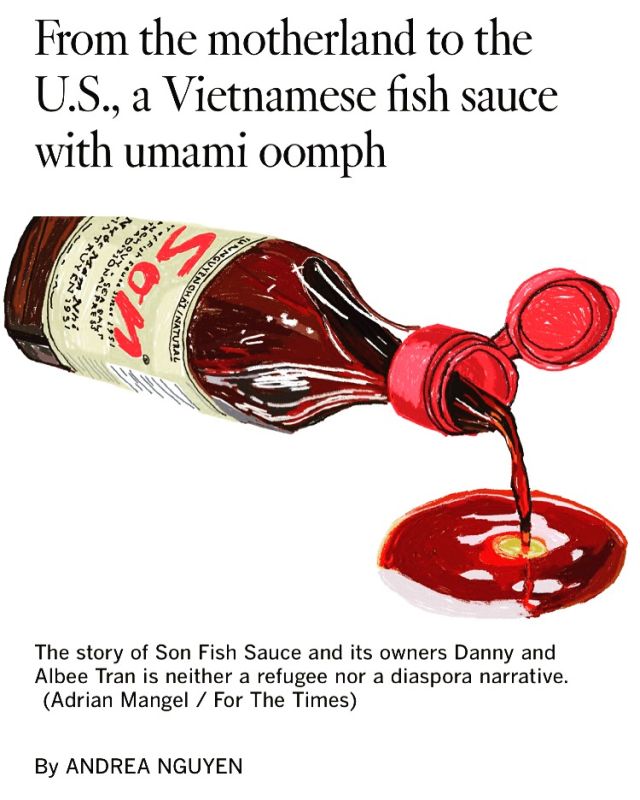People who have never used fish sauce before often want to know how long a bottle lasts and how to store it. The answer isn’t clear-cut because it depends on the type of fish sauce you have and how often you use it. A bottle of fish sauce can last for two to three years after it has been opened, or even longer. Hopefully you’ll go through a bottle of nuoc mam faster than those estimates.
To be honest, my kitchen isn’t neat, but I’ll let you look in my fridge, cabinet of condiments, and pantry (a dark hall closet). I spread my fish sauce stash in all three of those spots. The explanation below will hopefully explain my strategies.
Fish sauce is a staple condiment in many Asian cuisines, especially Southeast Asian dishes. With its umami depth and briny flavor, a splash of fish sauce can instantly elevate stir-fries, noodle bowls, dipping sauces, and more.
But like any perishable ingredient fish sauce doesn’t last forever once opened. So how long does an opened bottle of fish sauce remain good to use? What are the signs of fish sauce going bad? How should you store opened fish sauce to maximize its shelf life?
In this comprehensive guide, we’ll answer all those questions and more so you can enjoy fish sauce’s incredible flavor for as long as possible.
How Fish Sauce is Made
Before we dive into proper storage and shelf life, let’s quickly cover what fish sauce is and how it’s produced.
Fish sauce starts with small fish like anchovies, which are layered with salt and placed into large fermentation tanks. The fish and salt mixture ferments for anywhere from 8 months to over a year. This long fermentation period breaks down the fish into a highly flavorful, amber-brown liquid.
The liquid is then drained from the solids and bottled as fish sauce, sometimes with a second filtration to remove any fine particles. No other ingredients are added.
This simple but lengthy fermentation process is what allows fish sauce to last so incredibly long even after opening. The high salt content prevents microbial growth, while enzymatic activity during fermentation breaks down proteins into super savory compounds.
Unopened Shelf Life
An unopened bottle of fish sauce lasts quite a long time thanks to the preservative powers of salt. Most commercially bottled fish sauces have a shelf life of at least 12 months from the production date, if not longer. I’ve seen some brands listed as 36 months.
As long as the bottle remains factory sealed, fish sauce should remain good for at least 2-3 years past the bottled date when stored in a cool, dark pantry. Heat and sunlight are the enemies of shelf life, so do keep your unopened bottles away from these.
Some crystallization may occur in older bottles as the natural salts separate. This is harmless and does not indicate spoilage. The fish sauce can be used as normal.
If buying fish sauce from a store, check that bottles are not leaking or damaged. Also give them a sniff test – they should smell pleasantly briny and savory, never spoiled.
Opened Shelf Life
This is where storage conditions become especially important. Once exposed to air, fish sauce is more vulnerable to losing flavor and aroma. An opened bottle stored improperly can start deteriorating in just a few months.
But stored properly, fish sauce can actually last years after opening! Many sources cite refrigerated fish sauce lasting 3-4 years or longer after opening. Even unrefrigerated, fish sauce may last up to 1 year without significant quality loss.
The wide range comes down to the specific product, storage methods, and how frequently you use it. Fish sauce that’s used often will get replaced before any aging effects occur. Infrequently used bottles need more careful storage.
Here are some general guidelines for maximizing opened shelf life:
-
Store in the refrigerator – Chilling significantly slows down enzymatic reactions that cause flavor loss. For the longest shelf life, keep opened fish sauce refrigerated.
-
Keep away from light – UV exposure can accelerate fish sauce deterioration. Use an opaque bottle or keep the fish sauce in a dark pantry/fridge.
-
Watch for evaporation – As water content decreases, flavors concentrate and salt crystals may form. Check bottles occasionally and top off with a bit of water if the level drops significantly.
-
Limit air exposure – Always re-cap tightly after use. Consider decanting some into a smaller bottle if you don’t use it often. Less headspace = less air.
-
Know your product – Higher quality, artisanal fish sauces are less preserved than cheaper versions. They may require refrigeration to maintain peak quality once opened. Check the label instructions.
With optimal storage conditions, even premium fish sauces can last at least a year or two. I still have an early bottle of Red Boat fish sauce in my fridge that’s over 3 years old and tastes great.
Certain production methods also help extended shelf life. For instance, Megachef fish sauce uses an opaque sleeve to protect against light degradation. Some brands add preservatives like sodium benzoate, although this is more common with lower end products.
Signs of Spoilage
Because fish sauce ferments and ages as part of production, it won’t “spoil” in the traditional sense of growing mold.
However, chemical processes over time can lead to diminished quality:
-
Faded aroma – Fish sauce’s signature briny, savory aroma fades as flavor compounds degrade. If it smells dull/flat, it’s past its prime.
-
Muddled flavors – Nuances disappear, leaving behind one-dimensional salty flavor.
-
Bitter, metallic tastes – This indicates an over-aged, degraded product.
-
Rancid odors – A very old, over-oxidized fish sauce takes on stale, rancid notes.
-
Yeast growth – Visible surface yeast/foam usually means the sauce is too far gone.
-
Color changes – Darkening color can mean oxidation and flavor loss.
The most reliable gauge is your nose – sniff and taste a drop. Quality fish sauce smells enticing. Discard if dull, rancid, or clearly over the hill.
Extending Opened Shelf Life
Here are some pro tips for making your opened bottles of fish sauce last as long as possible:
-
Use less per use – The less you expose the remaining sauce to air, the slower deterioration. Use sparingly.
-
Transfer to smaller bottles – Fill a small condiment bottle so there’s less airspace. Bonus – easier to use.
-
Top off water – If levels drop significantly from evaporation, add a splash of water to keep it from oxidizing.
-
Don’t cross-contaminate – Use a clean spoon each time to avoid introducing bacteria. Keep drips wiped clean.
-
Freeze portioned amounts – Freezing portions like ice cubes stops reactions in their tracks. Thaw before using.
-
Treat it well – Avoid extreme heat, sunlight, etc. Think of fish sauce like a fine wine.
With TLC and smart storage, you can enjoy fish sauce for a remarkably long time after opening. Aging brings out deeper flavors as enzymatic processes continue, up to a point. Practice good fish sauce hygiene and your bottles will have very long lives!
Frequently Asked Questions
Does fish sauce need to be refrigerated?
Refrigeration is not mandatory, but it significantly slows deterioration and is recommended for prolonged storage. Even if kept in the pantry, fish sauce can last up to 1 year after opening.
Can you freeze fish sauce?
Freezing is not ideal for fish sauce bottles, as the expansion can cause leaks. However, freezing portioned amounts in ice cube trays is an effective way to halt aging. Thaw cubes before using.
Does fish sauce expire?
Like soy sauce, fish sauce doesn’t really “expire” in the traditional sense. thanks to its salt content and unique production process. Bottled fish sauce lasts 2-3 years unopened. Opened fish sauce slowly loses quality over time but may last 3-4 years refrigerated.
Does fish sauce go bad if not refrigerated?
It won’t “go bad” from a food safety standpoint, but fish sauce degrades much faster at room temperature versus chilled. For the longest shelf life, refrigeration is recommended after opening. Expect flavor and aroma to diminish faster if left unrefrigerated.
Why does my fish sauce have crystals?
Salt crystals at the bottom of the bottle are natural and harmless – they do not indicate spoilage. Fish sauce can be used as normal; simply give the bottle a little shake before using.
The Takeaway
When stored optimally and handled with care, fish sauce can maintain quality and flavor for an impressively long shelf life after opening. Refrigeration, limited light/air exposure, and good hygiene practices allow you to keep enjoying your favorite fish sauce for up to 3-4 years or longer.
Trust your nose – if it still smells enticing and complex, your fish sauce is good to go! With proper storage and usage habits, fish sauce’s incredible umami depth can continue enhancing your dishes for ages.

Fish Sauce Storage Basic Know-How
Let’s get this over with. You do not have to refrigerate fish sauce. In an article published at The Takeout, Cynthia James at Cornell University’s Cornell Food Venture Center discusses how soy sauce and fish sauce have “water activity” that are controlled, meaning that the water in the liquid condiments are very well bound to salt and other molecules.
The result is this: there’s little opportunity for pathogens to proliferate. So yes, you can keep fish sauce at room temperature without bacterial harm.
But just because you can do something, is it wise to always follow that rule? I do not.
Why Refrigerate Fish Sauce
To refrigerate fish sauce or not — that’s a personal and functional choice. My 85-year-old mom doesn’t refrigerate nuoc mam. She blasts through fish sauce with all the Viet cooking that she does. A cheaper bottle is for cooking, and a better bottle is for dipping foods. She usually has two open at the same time. That’s the typical, old-school Viet approach. Save the good stuff for the table.
There are eight bottles open right now so I can test them out in class, use them to make good recipes, and just be interested in the different brands I find. I dont refrigerate them all.

Son and Red Boat are two brands of Vietnamese artisanal fish sauce that I keep in my fridge. They have high nitrogen levels, which are a measure of how umami-rich a condiment is. A relatively high nitrogen level (“N”) means big flavor but it also makes fish sauces somewhat delicate. Left out at room temperature, those brands quickly develop gas inside their bottles. Open the cap and the fish sauce farts, which is somewhat alarming. I consider a fish sauces gassy stability to decide if it needs to be refrigerated.
Danny Tran of Son Fish Sauce suggested refrigerating high-grade fish sauce to keep them better. He said finding a good cap for fish sauce bottles is a challenge. It needs to fit tight but people should be able to open a cap with relative easy.

Cuong Pham of Red Boat used to advise keeping fish sauce at room temperature but the RB label now says to refrigerate also. He’s also careful in sourcing the caps for his bottles. He mentioned that the caps Red Boat uses give a little but are strong and tight fitting.
My fridge door also has a supermarket fish sauce, made by A Taste of Thai. I like that fish sauce, and even though it’s not expensive or high-end, I plan to keep it for a long time so I can use it to test recipes and bring it to class to taste nuoc mam. It’s a brand that’s carried at at only a handful of supermarkets so replacing it is hard. I’d rather keep it in a safe place — the fridge.
Another reason to keep fish sauce in the fridge is that the smell of the salty, savory fish will be less strong if you keep nuoc mam, nam pla, or patis cool. Note that high quality fish sauce is heady like dried porcini mushroom. Chill fish sauce to downplay its aroma.
